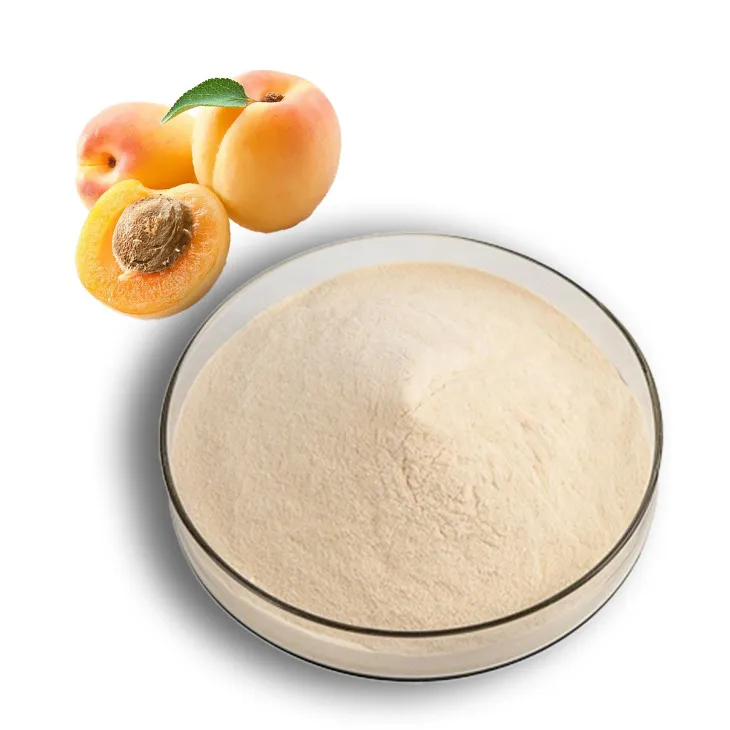- 0086-571-85302990
- sales@greenskybio.com
Apricot powder? Make sure you source from sustainable suppliers!
2024-12-21

The Significance of Almond Powder
Almond powder has become an increasingly popular ingredient in various products, from baking goods to skincare items. Its fine texture and rich, nutty flavor add a unique touch to many recipes. In baking, it can be used as a substitute for wheat flour in gluten - free products or simply to enhance the taste and nutritional value of cakes, cookies, and pastries. In skincare, almond powder is known for its exfoliating and moisturizing properties, making it a common ingredient in face masks and scrubs.

The Need for Sustainable Sourcing
Sustainable sourcing is not just a trendy concept but a necessity when it comes to almond powder. There are several reasons for this.
Long - Term Availability of Almonds
Almond production is highly dependent on specific environmental conditions. Almond trees require a significant amount of water, and in regions where water is scarce, over - extraction for almond farming can lead to long - term depletion of water resources. If we do not source almonds sustainably, we risk a decline in almond production in the future. For example, in California, which is one of the major almond - producing regions in the world, droughts have already posed challenges to almond growers. By sourcing from sustainable suppliers, we can ensure that the almond trees are grown in a way that conserves water and other resources, thus ensuring the long - term availability of almonds for almond powder production.
Fair Treatment of Growers
Sustainable sourcing also implies fair treatment of the growers. Almond growers often face various challenges, such as fluctuating market prices, high production costs, and competition from cheaper imports. When we source from sustainable suppliers, we are more likely to be dealing with suppliers who pay fair wages to the growers, provide safe working conditions, and support the local communities where the almonds are grown. This not only benefits the growers but also contributes to the overall quality of the almond powder. Growers who are fairly treated are more likely to take good care of their almond orchards, resulting in better - quality almonds and, consequently, better - quality almond powder.

Environmental Impact of Almond Farming
Almond farming has a significant environmental impact that needs to be considered when sourcing almond powder.
Water Usage
As mentioned earlier, almond trees are thirsty plants. In some areas, almond farming accounts for a large proportion of water usage. For instance, in certain regions of California, almond orchards use a substantial amount of the available water supply. Sustainable almond farming practices aim to reduce water consumption through techniques such as drip irrigation. When we source almond powder from sustainable suppliers, we are indirectly supporting these water - saving practices, which are crucial for the environment, especially in water - stressed regions.
Pesticide and Fertilizer Use
Conventional almond farming often relies on pesticides and fertilizers to protect the trees from pests and diseases and to enhance growth. However, excessive use of these chemicals can have negative impacts on the environment. Pesticides can contaminate soil, water, and air, and harm non - target organisms such as bees and other beneficial insects. Sustainable almond farming focuses on reducing pesticide and fertilizer use through integrated pest management (IPM) techniques and organic farming methods. By choosing almond powder from sustainable sources, we are promoting environmentally friendly farming practices that protect the ecosystem.

Benefits of Sustainable Sourcing for Product Quality
Sourcing almond powder from sustainable suppliers can have a direct impact on the quality of the final product.
Superior Nutritional Value
Sustainable almond farming practices often lead to almonds with better nutritional value. For example, almonds grown without excessive use of pesticides and fertilizers may contain higher levels of beneficial nutrients such as vitamins, minerals, and healthy fats. When these almonds are processed into powder, the resulting almond powder will also have a higher nutritional content, which is beneficial for consumers, especially those who use almond powder for its health - promoting properties in food or supplements.
Better Taste and Aroma
Almonds that are grown in a sustainable and well - managed environment tend to have a better taste and aroma. This is because the trees are not stressed by over - use of chemicals or improper farming techniques. When these high - quality almonds are turned into powder, the almond powder will inherit the superior taste and aroma. This can enhance the overall flavor profile of products in which the almond powder is used, whether it is a delicious almond - flavored cake or a fragrant skincare product.
How to Identify Sustainable Almond Powder Suppliers
For consumers and businesses alike, it is important to be able to identify sustainable almond powder suppliers.
Certifications
Look for suppliers who have relevant certifications. For example, organic certifications indicate that the almonds are grown without synthetic pesticides and fertilizers. Fairtrade certifications show that the growers are paid fair wages and work in good conditions. Other certifications such as Rainforest Alliance or UTZ may also be relevant, as they ensure that certain environmental and social standards are met in the production process.
Supply Chain Transparency
A good sustainable supplier should have a transparent supply chain. This means that they can provide information about where the almonds are sourced from, how they are grown, and what processing methods are used. Transparency allows consumers and businesses to make informed decisions and ensures that the supplier is accountable for their practices.
Local and Small - Scale Suppliers
Consider local and small - scale suppliers. These suppliers are often more likely to have a closer relationship with the growers and are more focused on sustainable practices. They may also have a smaller environmental footprint compared to large - scale industrial suppliers. For example, local suppliers may use more traditional and sustainable farming methods that are adapted to the local environment.
Conclusion
In conclusion, when using almond powder, sourcing from sustainable suppliers is of utmost importance. It not only ensures the long - term availability of almonds, promotes fair treatment of growers, and reduces environmental impact but also enhances the quality of the almond powder itself. By being aware of the significance of sustainable sourcing and learning how to identify sustainable suppliers, consumers and businesses can make more responsible choices, contributing to a more sustainable future for almond powder production and consumption.
FAQ:
Q1: Why is it important to source almond powder from sustainable suppliers?
It is crucial to source almond powder from sustainable suppliers for several reasons. Firstly, in terms of the long - term availability of almonds, sustainable practices ensure that almond orchards are managed in a way that doesn't deplete natural resources. This includes proper water management, soil conservation, and pest control methods that are environmentally friendly. Secondly, fair treatment of growers is an integral part of sustainability. When suppliers are sustainable, growers are more likely to receive fair wages and work in safe conditions. This also promotes the economic stability of the communities where almonds are grown. Moreover, sustainable supply chains can enhance the quality of the almond powder. For example, better farming practices can lead to healthier almonds, which in turn result in a higher - quality powder that can enhance the product or consumption experience.
Q2: How can one identify a sustainable almond powder supplier?
There are several ways to identify a sustainable almond powder supplier. Look for certifications such as organic certifications, which often indicate sustainable farming practices. These certifications usually require compliance with strict environmental and social standards. Another aspect to consider is the transparency of the supplier. A sustainable supplier should be able to provide information about their sourcing, such as where the almonds are grown and how the growers are treated. Additionally, check for any initiatives or partnerships that the supplier has with environmental or social organizations. Suppliers involved in projects related to water conservation, soil health improvement, or fair trade are more likely to be sustainable.
Q3: What are the environmental benefits of sustainable almond powder supply chains?
The environmental benefits of sustainable almond powder supply chains are numerous. Sustainable farming practices in almond orchards can reduce water usage through efficient irrigation systems. This is important as almond cultivation is water - intensive. Also, sustainable supply chains promote soil conservation. By using techniques like cover cropping and reduced tillage, the soil quality is maintained and erosion is minimized. Additionally, sustainable practices often involve the use of natural pest control methods, reducing the reliance on harmful pesticides and chemicals. This helps to protect the local ecosystem, including beneficial insects, birds, and other wildlife.
Q4: How does sourcing from sustainable suppliers affect the taste of almond powder?
Sourcing almond powder from sustainable suppliers can potentially enhance the taste. Sustainable farming practices often lead to healthier almonds. For example, almonds grown in well - managed orchards with proper soil nutrition are likely to be more flavorful. Also, the use of natural pest control methods instead of chemicals can result in almonds with a purer taste. When almonds are of better quality due to sustainable practices, the resulting almond powder will also have a superior taste, which can be noticed in products made with it or when consumed directly.
Q5: Are sustainable almond powder suppliers more expensive?
Not necessarily. While in some cases, sustainable almond powder suppliers may have slightly higher prices due to the additional costs associated with sustainable practices such as organic certifications or fair - trade premiums. However, in the long run, the overall cost - effectiveness can be comparable or even better. Sustainable practices can lead to more efficient production, reduced waste, and a more stable supply. Also, as the demand for sustainable products increases, economies of scale can come into play, potentially reducing the price difference. Additionally, the value - added aspects such as better quality and the positive environmental and social impacts can make the slightly higher price well - worth it for many consumers and businesses.
Related literature
- The Sustainability of Almond Production: A Comprehensive Review"
- "Sustainable Supply Chains in the Almond Industry: Current Practices and Future Directions"
- "Environmental and Social Impacts of Almond Farming: The Role of Sustainable Suppliers"
- ▶ Hesperidin
- ▶ Citrus Bioflavonoids
- ▶ Plant Extract
- ▶ lycopene
- ▶ Diosmin
- ▶ Grape seed extract
- ▶ Sea buckthorn Juice Powder
- ▶ Fruit Juice Powder
- ▶ Hops Extract
- ▶ Artichoke Extract
- ▶ Mushroom extract
- ▶ Astaxanthin
- ▶ Green Tea Extract
- ▶ Curcumin
- ▶ Horse Chestnut Extract
- ▶ Other Product
- ▶ Boswellia Serrata Extract
- ▶ Resveratrol
- ▶ Marigold Extract
- ▶ Grape Leaf Extract
- ▶ New Product
- ▶ Aminolevulinic acid
- ▶ Cranberry Extract
- ▶ Red Yeast Rice
- ▶ Red Wine Extract
-
Passionflower Extract
2024-12-21
-
Bitter Melon Extract
2024-12-21
-
Milk Thistle Extract
2024-12-21
-
Thunder God Vine Extract
2024-12-21
-
Hedyotis Diffusa Extract
2024-12-21
-
Sophora Flavescens Root Extract
2024-12-21
-
Centella Asiatica Extract
2024-12-21
-
Jujube Extract
2024-12-21
-
Calendula Extract
2024-12-21
-
Black Pepper Extract
2024-12-21





















